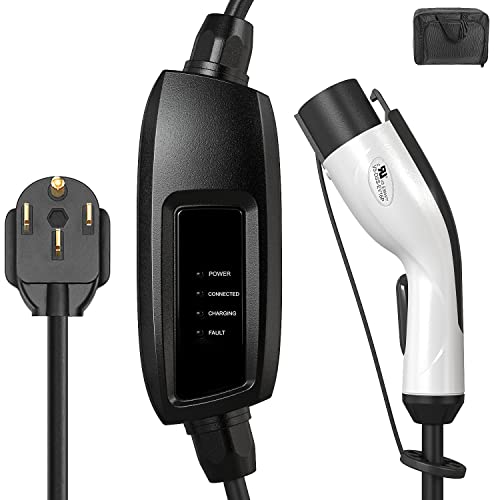The Future of Mobility: Home Electric Vehicle Charging Stations

- 1. The Future of Mobility: Home Electric Vehicle Charging Stations
- 1.1. The Importance of Home Electric Vehicle Charging Stations
- 1.1.1. Convenience
- 1.1.2. Cost Savings
- 1.1.3. Reducing Emissions
- 1.1.4. Freedom and Independence
- 1.2. What Are The Different Types Of EV Chargers?
- 1.2.1. Fast EV Chargers
- 1.2.2. Rapid EV Chargers
- 1.3. What To Consider When Buying An EV Charger
- 1.3.1. Charging Speed
- 1.3.2. Tethered or Untethered
- 1.3.3. Location
- 1.3.4. Costs
- 1.3.5. Brands
- 1.4. Future Developments in Home EV Charging
- 1.5. Conclusion
- 1.1. The Importance of Home Electric Vehicle Charging Stations
A transportation revolution is currently underway across the globe, driven by the increasing popularity of electric vehicles (EVs). As the importance of environmental sustainability and the necessity to reduce carbon emissions gain prominence, an ever-growing number of individuals are opting for electric cars. Alongside the surge in EV adoption, there is a corresponding increase in the demand for residential electric vehicle charging stations. This article delves into the significance of home EV charging stations, their advantages, installation possibilities, and the forthcoming developments in residential electric vehicle charging.
The Importance of Home Electric Vehicle Charging Stations
Convenience
The convenience of home EV charging stations is unparalleled. Instead of having to make trips to public charging stations, EV owners can easily connect their vehicles right in the comfort of their own homes. This means you can wake up each morning with a fully charged vehicle, ready for your daily commute or adventures.
Cost Savings
Charging your EV at home can lead to substantial cost savings compared to using public charging stations. Electricity is generally more cost-effective per mile than gasoline, and it becomes even more economically advantageous when taking advantage of off-peak charging rates.
Reducing Emissions
One of the primary reasons for transitioning to electric vehicles is to reduce greenhouse gas emissions. Home charging ensures that your EV is powered by cleaner energy sources, thereby making your daily drive more environmentally friendly.
Freedom and Independence
Home charging stations offer a sense of freedom and independence. You are not reliant on the availability of public charging stations, and there's no need to worry about waiting in line to charge your vehicle.
What Are The Different Types Of EV Chargers?
There are two primary categories of EV chargers:
Fast EV Chargers
Fast EV chargers typically have power ratings ranging from 7kW to 22kW. The charging time for your electric vehicle using these chargers varies from 1 to 6 hours, depending on the size of the car's battery. Similar to slow EV chargers, they utilize alternating current (AC) and can be either tethered or untethered. However, they can also be single-phase or three-phase, depending on the connector type. These chargers are suitable for car charging at locations such as workplaces, homes, and various other destinations.
Fast EV Chargers come with two connector types:
- Type 1
- Type 2
Rapid EV Chargers
Rapid EV chargers are designed to charge an electric vehicle in as little as 30 minutes. They employ three-phase direct current (DC) to deliver power of up to 50kW. Some ultra-rapid car chargers can provide power at even higher rates, reaching up to 350 kW. Rapid EV chargers typically come with tethered cables, and they are not commonly installed at homes due to their high-speed charging capabilities. Instead, you can typically find them at locations such as motorway service stations, petrol stations, and other public destinations.
Rapid EV Chargers offer four connector types:
- Type 2 Mennekes
- CHAdeMO
- CCS
- Tesla Type 2
What To Consider When Buying An EV Charger
When considering the purchase of an EV charger, it's crucial to take into account several factors to ensure you acquire the most suitable charging solution for your electric vehicle. Below, we've outlined key considerations before you invest in a new EV charger:
Charging Speed
The charging speed is a critical factor when installing a home EV charging station. These units typically range from 3kW to 22kW, and the higher the power rating, the faster they can charge your EV. For example, a 3.7kW wallbox charger could fully charge a 40kWh Nissan Leaf EV in around 13 hours, providing 168 miles of range overnight. In contrast, a 7kW system could accomplish this in under 6 hours, and a 22kW charger could deliver a complete charge in less than 2 hours.
Tethered or Untethered
Decide whether you prefer a tethered or untethered wallbox charger. Tethered chargers come with a cable attached to the charger, similar to traditional fuel pumps. They offer convenience as you don't need to retrieve your cable every time you charge your vehicle. However, if you purchase a vehicle with a different connector type, your charger might become incompatible. Untethered chargers do not include a cable; you'll need to use your own (usually included with your EV purchase) and manually connect it to the charger. Although less convenient, untethered chargers are more future-proof, as you can upgrade the plug configuration if needed.
Location
Choose a suitable location on your property for the EV charger installation. Most installations require off-road parking like a driveway or garage and should be positioned near an electricity panel for power supply. Consult a qualified electrician if you're unsure about the installation location.
Costs
Determine the cost of the EV charger. Your budget is a primary consideration when installing a home charging station. EV charger prices range from £400 to £1000, and installation fees can increase the total cost. The final price depends on the brand and model you select. Avoid opting for the cheapest option, as this may compromise the efficiency and performance of your system. Remember that an EV charger is a long-term investment, so choose a product that suits your needs.
Brands
There are numerous EV charger brands available. Here's a list of some popular brands we offer:
- Easee
- Sevadis
- Wallbox
- ProjectEV
- Pod Point
Future Developments in Home EV Charging
As the adoption of electric vehicles continues to expand, we anticipate witnessing several exciting advancements in the realm of home EV charging:
- Intelligent Charging
The prevalence of smart charging systems is set to increase. These systems can optimize charging schedules by considering factors such as energy costs, grid demand, and user preferences. Consequently, EV charging will become even more cost-efficient and environmentally sustainable. - Solar Integration
Numerous homeowners are delving into the idea of incorporating solar panels into their home charging setups. This enables them to power their electric vehicles using clean, renewable energy generated right on their property. - Enhanced Charging Speed
Charging technology is progressing at a rapid pace. In the forthcoming years, we can anticipate even swifter charging speeds, which will significantly reduce the time required to charge an EV to a level that can compete with the refueling process of a gasoline vehicle.
Conclusion
Home electric vehicle charging stations play a pivotal role in driving the EV revolution, delivering convenience, financial savings, and ecological advantages. As technological progress marches forward, we anticipate further captivating innovations within the realm of residential EV charging. With the surging popularity of electric vehicles, home charging stations transcend mere convenience, evolving into an indispensable element for a sustainable and eco-friendly energy future. Whether you currently own an EV or contemplate transitioning to one, the installation of a home charging station represents a prudent commitment to both your future and the well-being of our planet.











